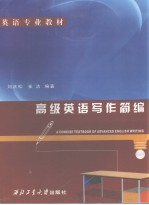图书介绍
高级英语写作简编 英文PDF|Epub|txt|kindle电子书版本网盘下载

- 刘庆松,崔洁编著 著
- 出版社: 西安:西北工业大学出版社
- ISBN:7561220685
- 出版时间:2006
- 标注页数:237页
- 文件大小:98MB
- 文件页数:40192104页
- 主题词:英语-写作
PDF下载
下载说明
高级英语写作简编 英文PDF格式电子书版下载
下载的文件为RAR压缩包。需要使用解压软件进行解压得到PDF格式图书。建议使用BT下载工具Free Download Manager进行下载,简称FDM(免费,没有广告,支持多平台)。本站资源全部打包为BT种子。所以需要使用专业的BT下载软件进行下载。如BitComet qBittorrent uTorrent等BT下载工具。迅雷目前由于本站不是热门资源。不推荐使用!后期资源热门了。安装了迅雷也可以迅雷进行下载!
(文件页数 要大于 标注页数,上中下等多册电子书除外)
注意:本站所有压缩包均有解压码: 点击下载压缩包解压工具
图书目录
Part 1 Introduction1
1.1 Effective Writing1
1.2 Demands of the Course4
1.3 Autobiography6
Part 2 Reaching Your Audience10
2.1 Reaching Your Audience10
2.2 Style,Voice,and Tone11
2.3 Style Through Vocabulary and Diction12
2.4 Inappropriate Word Usage14
Part 3 Polishing Sentences18
3.1 Sentence Fragments18
3.2 Sentence Patterns19
3.3 Precise Vocabulary for Complete Ideas20
3.4 Symbols That Stand for Errors in an Essay20
Part 4 Polishing Paragraphs27
4.1 Paragraph Structure27
4.2 Topic Sentence30
4.3 Patterns for Presenting Information32
4.4 Developing Levels of Specificity41
4.5 Paragraph Size42
Part 5 Main Idea and Pattern of Organization45
5.1 Working Through Early Stages in Forming the Main Idea of the Writing45
5.2 Knowing Your Goals46
5.3 Strategies for Generating and Narrowing Main Idea49
5.4 Methods for Arranging Ideas51
5.5 Choosing Part of a Larger Topic55
5.6 Using the Modes57
Part 6 Gathering Information and Ideas:Memory,Reading and Observation65
6.1 Gathering Information to Support Main Idea and Pattern of Organization66
6.2 Strategies for Tapping Memory66
6.3 Selecting Sources for Reading70
6.4 Strategies for Observation72
Part 7 Gathering Information and Ideas:Interviewing78
7.1 Guidelines for Interviewing78
7.2 Practicing Interviewing One of Your Teachers82
7.3 Using Videotapes to Learn Interviewing Techniques85
Part 8 Elements of Writing Essays87
8.1 Timeliness87
8.2 Emotion90
8.3 Thesis Statement95
Part 9 Comparison-and-contrast104
9.1 Elements of Comparison-and-contrast105
9.2 Keeping Balance109
9.3 Drawing an Analogy113
Part 10 Argument116
10.1 Occasions for Argumentative Essays116
10.2 Arguing in Context116
10.3 Stating Your Proposition117
10.4 Anticipating Opposition118
10.5 Expanding Your Argument120
10.6 Three Argumentative Appeals:Reason,Ethics,Emotion120
10.7 Form:Tradition and Innovation125
10.8 Arguing for Consensus127
Part 11 Inductive Reasoning132
11.1 Generalizing from Data(Induction)132
11.2 Elements of Induction133
11.3 Steps in Inductive Reasoning134
11.4 Guidelines for Inductive Reasoning135
Part 12 Deductive Reasoning139
12.1 The Categorical Argument139
12.2 The Conditional Argument140
Part 13 Writing a Research Paper144
13.1 The Nature of Research144
13.2 Collecting Information146
13.3 Techniques for Preparing Research-paper Writing151
Part 14 Procedures in Graduate Study158
14.1 Doing Research158
14.2 Becoming Part of the Research Community170
Part 15 How to Write an Abstract174
15.1 What Is an Abstract?174
15.2 Guidelines for Writing an Abstract175
15.3 Structure of an Abstract175
15.4 The Style of an Abstract178
15.5 Commonly Used Sentence Patterns179
15.6 Key Words179
Part 16 Quoting and Documenting181
16.1 Locating the Sources181
16.2 Introducing a Quotation182
16.3 When to Use Quotation Marks;When to Document183
16.4 Format and Punctuation for Quotations184
Part 17 Composing a Poem189
17.1 Defining Poetry189
17.2 Techniques of Composing Poems192
17.3 Diction200
17.4 Metre or Meter:Poetry Rhythm202
17.5 Amateur Poetry as Therapy204
Appendices206
1 Writing and Presenting Your Thesis or Dissertation206
2 Using Modern Language Association(MLA)Format218
Glossary231
Bibliography236